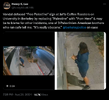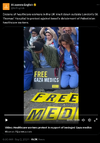Hundreds of thousands of Israelis gathered in Tel Aviv on Sunday evening, with tens of thousands more demonstrating across the country in the largest protests since October 7, expressing pain and anger and demanding a hostage-ceasefire deal after the army recovered six bodies of hostages executed by the Hamas terror group.
Organizers estimated that 300,000 people gathered in Tel Aviv and an additional 200,000 took part in protests across the country. The Crowd Solutions firm estimated that some 280,000 people participated in the Tel Aviv demonstration, in what would be the largest rally in almost 18 months. There were no official numbers from police.
The Tel Aviv protest began with a march from Dizengoff Street to the Begin Gate of the IDF headquarters, carrying six “symbolic coffins” to symbolize the six bodies that were recovered on Saturday night.
The bodies of Hersh Goldberg-Polin, 23, Eden Yerushalmi, 24, Ori Danino, 25, Alex Lobanov, 32, Carmel Gat, 40, and Almog Sarusi, 27, were discovered in a tunnel in Gaza’s southern city of Rafah.
An autopsy found that they had been shot in the head and body multiple times at close range between Thursday and Friday morning.
The news of their murders after nearly 11 months of captivity sparked an outpouring of national grief and anger, much of it directed at Prime Minister Benjamin Netanyahu who has been accused of holding up a hostage deal for political reasons.
Demonstrators chanted “Now! Now!” as they demanded Netanyahu reach a ceasefire with Hamas to bring the remaining captives home. Others chanted: “We want them back alive.”
Protesters carried Israeli flags, yellow ribbons in honor of the hostages, and signs apologizing to the six dead hostages.
“We really think that the government is making these decisions for its own conservation and not for the lives of the hostages, and we need to tell them, ‘Stop!’” said Shlomit Hacohen, a Tel Aviv resident.
Ramping up pressure on Netanyahu, Histadrut Labor Federation chief Arnon Bar-David declared a general strike for Monday over the government’s failure to secure the release of hostages held in Gaza.
Speakers at the Tel Aviv protest included relatives of hostages still in Gaza, as well as Bar-David and Lior Simcha, the secretary general of the Kibbutz Movement.
Lior Rudaeff‘s son, Nadav, spoke at the Tel Aviv protest where he said the government had violated its contract with the people of Israel. Rudaeff was killed on October 7 and his body was taken to Gaza.
“If you hadn’t sabotaged a deal again and again, 26 hostages who were murdered in captivity would be here today with us, alive. Six of them survived until last week in a hell that most of you MKs wouldn’t have survived for one day,” he charged.
Einav Zangauker, mother of hostage Matan Zangauker, said: “Matan is alive. My son is still alive. But every day is a Russian roulette.” Netanyahu, she said, will play it “until they’re all dead, [but] we won’t let him.” She said the six murdered hostages died “on the altar of the Philadelphi [Corridor] spin,” referring to the Gaza-Egypt border, where the premier has insisted Israel must retain control.
The six could have been saved, and the rest of the hostages can still be saved, she argued.
To the newly bereaved families, Zangauker said: “You are not alone. The people of Israel embrace you. The blood of your loved ones won’t be in vain. We’ll do everything to get all the hostages home.”
“The history books will not have sufficient space to record the magnitude” of the disaster Netanyahu has wrought, she asserted. “Your time is up,” she said. “I, Einav Zangauker, a Likudnik from Ofakim, tell you it’s over.”
She concluded: “This is the time to act. To shake the nation until there is a deal. Go to the streets, people of Israel. Go to the streets!”
Matan Zangauker’s girlfriend, Ilana Gritzewsky, who was also taken hostage and released in November as part of a deal, said she knew what the hell of captivity looked like.
Netanyahu “doesn’t know what it’s like to have death hovering over you all day, he doesn’t know what it’s like to be in captivity and hear the prime minister say that the war is going to be long,” she said.
Union chief Bar-David vowed that “the entire country will stand still tomorrow” and accused the government of forsaking the whole country.
“The key word here is abandonment” of the hostages, as well as of the country’s south, north, and the “unbelievable abandonment of the economy,” while “coalition funds are funneled to unnecessary government offices,” he charged.
“The key word here is abandonment” of the hostages, as well as of the country’s south, north, and the “unbelievable abandonment of the economy,” while “coalition funds are funneled to unnecessary government offices,” he charged.
Bar-David said he had promised hostage families to use his power to shut down the economy “when the time comes.”
“That time is now,” he said.
Following the Tel Aviv protest, thousands descended to the Ayalon Highway where they blocked traffic for three hours, with some setting off fireworks, lighting fires on the road, and placing rocks, fences, nails and metal objects on the road. Some chanted, “Bibi is murdering the hostages,” using Netanyahu’s nickname.
Police said in a statement that they were “forced” to declare the protest on the Ayalon illegal and then “used crowd control measures to disperse the rioters.”
Around 30 protesters were arrested in Tel Aviv, in addition to five in Jerusalem and others elsewhere around the country.
Police clashed with some of the thousands of protesters on the Ayalon Highway as they attempted to clear the road, including by using water cannons. At least four stun grenades were thrown by cops, lightly hurting several people including Labor MK Naama Lazimi and her adviser, and knocking them down on the road.
“There was then another blast that was close and almost hit us directly,” Lazimi recounted later on X, adding that a police officer had then noticed what was happening and pulled them away, and that “miraculously, nothing happened beyond a few superficial bruises.” She argued that no friction had been going on when the grenades were hurled “completely by surprise and without any warning.”
Lazimi claimed police were “endangering the public’s safety” and acting illegally to serve far-right National Security Minister Itamar Ben Gvir, who is in charge of police.
Police said an officer lost her consciousness during a “riot” and was hospitalized, without detailing what had happened.
A 51-year-old demonstrator was moderately injured and hospitalized after falling from a height of 2.5 meters, the Ynet news site reported.
The protests, which took place across the country, kicked off with thousands gathering to protest outside the Prime Minister’s Office near the Knesset in Jerusalem during an emergency meeting of the security cabinet.
Many of the protesters blew whistles and trumpets to disrupt the meeting, causing deafening noise. Half an hour into the rally, the crowd observed a minute of silence to honor the hostages. After the minute passed, the crowd erupted again into loud whistles and shouts.
“This was the last minute of silence you will have,” shouted one of the organizers in a bullhorn, as he proceeded to read out the names of ministers. “We will not give this security cabinet a moment of quiet until all the hostages are released!”
In Jerusalem, demonstrators also later blocked a key entrance to the city where they clashed with police trying to clear the roads.
Thousands also demonstrated at dozens of bridges, highways and cities around the country in what were likely the largest protests since October 7.
Hostage Naama Levy‘s grandfather, Shaul Levy, participated in a protest in Beersheba and said that the current social and political situation made the hostages’ families feel hopeless.
“When Netanyahu says he wants to destroy Hamas, it won’t happen. What is really happening is that he’s destroying us,” he said.
Opposition politicians had also urged the public to take to the streets and took part in the demonstrations.
He also called on Israelis to join the strike on Monday.
It is believed that 97 of the 251 hostages abducted by Hamas on October 7 remain in Gaza, including the bodies of at least 33 confirmed dead by the IDF.
Hamas released 105 civilians during a weeklong truce in late November, and four hostages were released before that. Eight hostages have been rescued by troops alive, and the bodies of 37 hostages have also been recovered, including three mistakenly killed by the military as they tried to escape their captors.
Hamas is also holding two Israeli civilians who entered the Strip in 2014 and 2015, as well as the bodies of two IDF soldiers who were killed in 2014.

 reinfovf.com
reinfovf.com










